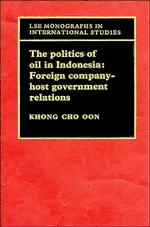Book contents
- Frontmatter
- Contents
- List of figures
- Acknowledgments
- 1 THE IMPACT OF THE FOREIGN COMPANY ON GOVERNMENT POLICIES IN LESS-DEVELOPED COUNTRIES
- 2 THE INDONESIAN PETROLEUM INDUSTRY: FORM AND CONTENT OF AGREEMENTS
- 3 FINANCIAL PROVISIONS AND CONSEQUENT AREAS OF DISPUTE
- 4 PROVISIONS FOR DEVELOPMENT AND NATIONAL CONTROL
- 5 PROBLEMS OF NEGOTIATION AND CONTRACTUAL CHANGE
- 6 ORGANISATIONAL STRUCTURE AND THE NEGOTIATING PROCESS
- 7 SOME REGIONAL CONSIDERATIONS FOR SOUTHEAST-ASIAN OIL-PRODUCER GOVERNMENTS
- 8 THE VIABILITY OF TRANSNATIONAL MINERAL AGREEMENTS
- Notes
- Select bibliography
- Index
7 - SOME REGIONAL CONSIDERATIONS FOR SOUTHEAST-ASIAN OIL-PRODUCER GOVERNMENTS
Published online by Cambridge University Press: 05 November 2011
- Frontmatter
- Contents
- List of figures
- Acknowledgments
- 1 THE IMPACT OF THE FOREIGN COMPANY ON GOVERNMENT POLICIES IN LESS-DEVELOPED COUNTRIES
- 2 THE INDONESIAN PETROLEUM INDUSTRY: FORM AND CONTENT OF AGREEMENTS
- 3 FINANCIAL PROVISIONS AND CONSEQUENT AREAS OF DISPUTE
- 4 PROVISIONS FOR DEVELOPMENT AND NATIONAL CONTROL
- 5 PROBLEMS OF NEGOTIATION AND CONTRACTUAL CHANGE
- 6 ORGANISATIONAL STRUCTURE AND THE NEGOTIATING PROCESS
- 7 SOME REGIONAL CONSIDERATIONS FOR SOUTHEAST-ASIAN OIL-PRODUCER GOVERNMENTS
- 8 THE VIABILITY OF TRANSNATIONAL MINERAL AGREEMENTS
- Notes
- Select bibliography
- Index
Summary
THE SEARCH FOR APPROPRIATE MODELS
The relationship between host state and foreign corporation has been the central concern of this analysis. This contractual relationship is only part of a triangular framework of which the foreign company's home country forms the third apex, and this factor has at times worked to shape the considerations of the other two actors. However, the scope of their concerns goes beyond this basic structure to encompass other such triangular frameworks formed by contractual relationships which are perceived to be relevant. The vast majority of the community of states act as hosts for transnational corporations, establishing contractual relationships whose terms may become the points of reference for later contract agreements between companies and governments, whether as a result of the investor attempting to secure contract terms equivalent to those agreed before for fear of establishing a precedent, or of the host government seeking new ways to increase its bargaining power. A more complex construct is required to reflect all the relevant extraneous facts for any particular contractual negotiation. It would prove too unwieldy for productive analysis. Nevertheless, in considering the problems faced by both foreign investor and host government in negotiating any one contract, the wider considerations posed by those features of other investment agreements which the negotiating parties regard as relevant, do have to be taken into account.
Contract negotiations take place within a system which is essentially bilateral in nature, with no overall framework such as exists theoretically in a free market in which the behaviour of other market participants provides relevant information and induces competition among buyers and sellers.
- Type
- Chapter
- Information
- The Politics of Oil in IndonesiaForeign Company-Host Government Relations, pp. 187 - 219Publisher: Cambridge University PressPrint publication year: 1986



